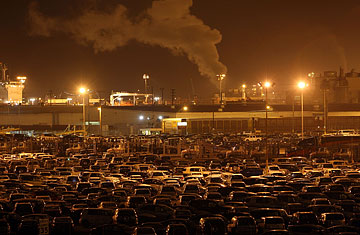
Newly imported cars fill the 150-acre terminal lot at the Toyota Long Beach Vehicle Distribution Center at the Port of Long Beach in California
Nothing so cheers the soul of a hardened businessman as the sight of a competitor on his knees. So you'd expect the spectacle this week of Detroit's struggling Big Three carmakers begging Congress for $34 billion in loans and lines of credit would be cause to break out the sake in Japanese boardrooms.
After all, Japan's own big three — Toyota, Honda and Nissan — have battled for decades to surpass once mighty GM, Ford and Chrysler. Now it would appear victory is at hand. Even if lawmakers bail out all three, the U.S. companies will require major restructuring that will leave them smaller and weaker, making it easier for their Asian rivals to gain market share both in the U.S. and globally. (See the 50 worst cars of all time.)
Yet Japan's automakers are not celebrating. Far from it. They are suffering mightily from the same massive decline in auto sales that is killing Detroit. Moreover, the bankruptcy of one or more of the Big Three could create havoc among parts suppliers that sell to Japan's carmakers; job losses would send more shock waves through the U.S. economy, deepening the recession in what is by far the largest single market for Japanese cars. "What we're seeing is the 30-foot tsunami that not even Toyota can cope with," says Tatsuo Yoshida, executive director and senior analyst at UBS Securities Japan.
While no Japanese automaker is on the brink of bankruptcy, Toyota's executive vice president Mitsuo Kinoshita calls the sharp contraction of global sales "unprecedented." Toyota, Honda and Nissan are slashing earnings estimates, firing workers and trimming production. In November, the Japanese auto industry saw its worst month in more than three decades, as domestic sales fell 27.3% compared with the same month last year. Sales of Japanese cars in the U.S. fell more than 30% last month.
Toyota, the industry behemoth, just recorded its seventh consecutive month of declining sales, and the company's second-quarter net profit plunged nearly 70%. Toyota has cut its earnings forecast for the fiscal year ending March 2009 to $6 billion, which is just one-third the profit it made the previous year. "You are looking at the deepest downturn that Japanese automakers have ever seen," says Chris Richter, senior research analyst at CLSA, a Hong Kong–based brokerage house. "They've faced downturns before, but not downturns in virtually every global market simultaneously. Even Honda Civics and Toyota Priuses aren't selling well."
This bleak outlook could get even worse, at least in the short term, if GM, Ford or Chrysler went bust. That's because of a domino effect that would probably result in the subsequent failures of parts suppliers that also sell to factories operated by Toyota, Honda and Nissan in the U.S. Vehicles built on American soil accounted for 63% of Japan's total U.S. sales in 2007, according to the Japan Automobile Manufacturers Association. A sudden parts shortage could force companies to shut down some of those assembly lines, generating major losses.
In addition, the loss of hundreds of thousands of jobs due to the disappearance of a major manufacturer — not to mention the blow that would be dealt to U.S. consumer confidence by the bankruptcy of an iconic brand — would mean even fewer cars sold. That would take another bite out of consumer finance receivables, the biggest asset on carmakers' books. So even though Japan would almost automatically gain market share if a U.S. carmaker went under, any gains would be outweighed by the negative impacts. "In this environment, gaining market share is not a good strategy," says Yoshida.
In ordinary times, gaining market share was Job One for Japan. But now executives are trying to figure out how to cope under circumstances they have never faced before. Sacred cows are being sacrificed to preserve earnings: Honda announced today that it was pulling out of Formula One racing to focus on its core business. Toyota, which has seen its stock drop more than 50% since the beginning of the year, established an Emergency Profit Improvement Committee chaired by company president Katsuaki Watanabe. Since forming the committee last month, Toyota has planned cuts to production, as well as layoffs for 50% of its contract workers by the end of March and a 10% reduction in winter bonuses for managers.
Additional steps are expected. But Toyota's options are dwindling, says Yoshida. The company in October tried to stimulate U.S. sales by offering 0% financing, a tactic Detroit can no longer afford. But frightened, cash-strapped consumers didn't bite. Japanese car companies are also shifting their focus to India and China, but even though those markets are still growing, they remain relatively small, and their contribution to profits isn't significant enough to offset the decline in North America. Says Yoshida: "The water that has spilled out of the bucket cannot be caught by a small single glass." At least Japanese carmakers are unlikely to kick the bucket. Detroit may not be so fortunate.
